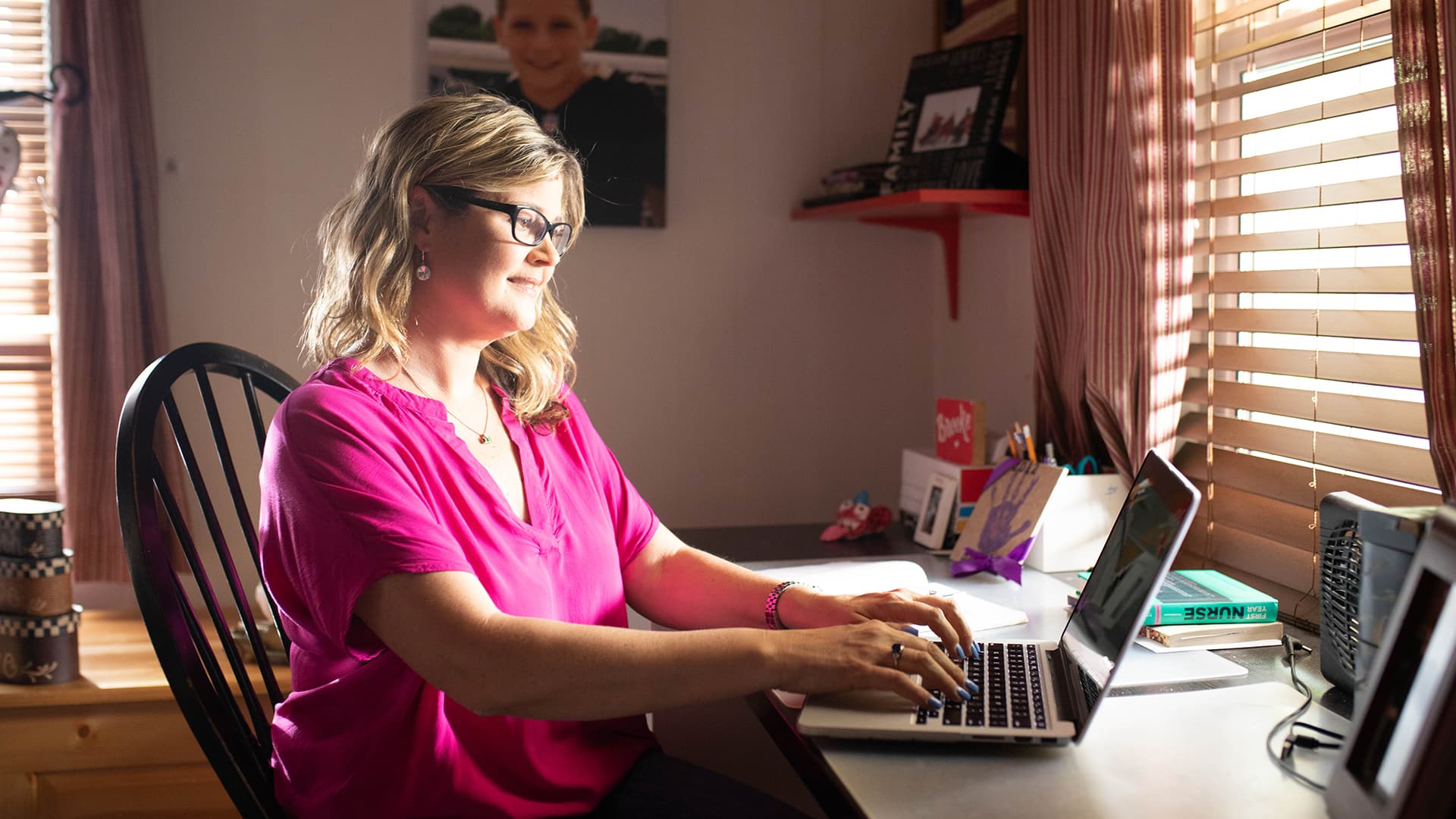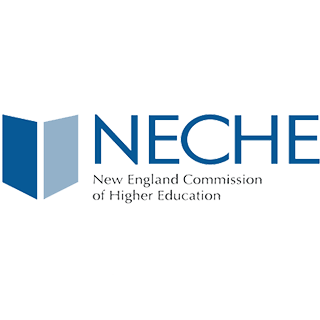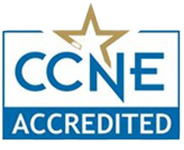The Importance of Health Education
Health | 10min Read

Earn the degree you need to enter one of the fastest-growing healthcare occupations in the nation with the Master of Science in Nursing (MSN) - Family Nurse Practitioner (FNP) track from Southern New Hampshire University. Upon completion, you'll meet the educational requirements to sit for a Family Nurse Practitioner national certification examination.

In the MSN Family Nurse Practitioner track, you'll develop the skills you need to assess and diagnose patients, create treatment plans and manage the health of patients of all ages and diverse healthcare needs.
To help prepare you for success as a practicing FNP, this 51-credit program starts with innovative online coursework, followed by a multi-day immersion experience, and culminates with 750 practicum hours under the guidance of preceptors.
Visit the course catalog to view the full MSN FNP curriculum.
Note: NUR-600 requires you to travel to New Hampshire for a multi-day simulation and assessment experience. The cost is $2,000 in addition to your course tuition. Your travel, lodging and meal costs are not included.
Clinical practice experience (CPE): Clinical practice hours are incorporated into all SNHU graduate nursing tracks.
The Commission on Collegiate Nursing Education (CCNE) requires that all CCNE-accredited baccalaureate, master’s, and Doctor of Nursing Practice (DNP) programs, as well as post-graduate APRN certificate programs, include clinical practice experiences appropriate for the roles for which students are being prepared. This requirement extends not only to the overall degree or certificate program but to each track within the degree and/or post-graduate APRN certificate program.
SNHU incorporates these authentic learning experiences into your MSN program through indirect and direct clinical experiences. You'll be able to achieve these CPE hours through coursework and assignments and time spent under the guidance of a preceptor, depending on your track choice. Connect with our Student Experience team to learn more about clinical practice experiences by track.
Practicum Experiences: Within the family nurse practitioner track, under the guidance of primary care providers, students will engage with patients across the lifespan in a variety of primary care settings. The 750 clinical practicum hours will be completed across five courses.
Students enrolled in the MSN program must comply with the requirements of the organizations where their clinical practice experiences/practicum will be completed. These requirements may include (but are not limited to) a criminal background check, active and unencumbered license verification, immunization records and professional liability insurance. Students may incur additional costs to meet organizational requirements (ex. drug screening, physical examination co-pay, etc.). These requirements must be met prior to registering for the clinical practice experience courses.
It is a requirement that nursing students carry their own medical malpractice insurance while enrolled in practicum courses. At least two terms before the start of the clinical components, students will be required to demonstrate proof of having an active individual medical malpractice certificate.
| Component Type | PC (Windows OS) |
|---|---|
| Operating System | Currently supported operating system from Microsoft. |
| Memory (RAM) | 8GB or higher |
| Hard Drive | 100GB or higher |
| Antivirus Software | Required for campus students. Strongly recommended for online students. |
| SNHU Purchase Programs | Visit Dell |
| Internet/ Bandwidth | 5 Mbps Download, 1 Mbps Upload and less than 100ms Latency |
| Component Type | Apple (Mac OS) |
|---|---|
| Operating System | Currently supported operating system from Apple. |
| Memory (RAM) | 8GB or higher |
| Hard Drive | 100GB or higher |
| Antivirus Software | Required for campus students. Strongly recommended for online students. |
| SNHU Purchase Programs | Visit Apple |
| Internet/ Bandwidth | 5 Mbps Download, 1 Mbps Upload and less than 100ms Latency |
Additional Information:
Students enrolled in the BSN program are responsible for ensuring they have the minimum system hardware, software, and equipment. In addition to the original SNHU technology requirements, BSN students should have the following:
SNHU has provided additional information for programs that educationally prepare students for professional licensure or certification. Learn more about what that means for your program on our licensure and certification disclosure page.
Our no-commitment application can help you decide if SNHU is the right college for you and your career goals. Apply up until 2 days before the term starts!
Upcoming term starts: Aug. 25, 2025 | Nov. 10, 2025
Attending college online at SNHU can be a life-changing experience. In fact, 93.2% of online students would recommend SNHU according to a 2023 survey with 21,000+ respondents.
You’ll take your courses within SNHU’s Brightspace platform. This is where you’ll find your:

In Southern New Hampshire University's online MSN programs, you'll learn from instructors with real-world experience. All of our full-time faculty are doctorally prepared and come to the classroom with healthcare experience.
Outside of SNHU, Dr. Jequie Dixon is a hospitalist nurse practitioner. Previously, she served as an officer in the United States Air Force, where she was a clinical nurse and disease manager.
Position
Undergraduate Faculty, Nursing
Joined SNHU
2017
Education
“At SNHU, we teach to the highest-level national standards. That way, nurses who graduate from our nurse practitioner program have the knowledge and skills needed to begin a new career."
Jequie Dixon, DNP, MSN, RN, PMC
At Southern New Hampshire University, you'll have access to a powerful network of more than 400,000 students, alumni and staff that can help support you long after graduation. Our instructors offer relevant, real-world expertise to help you understand and navigate the field. Plus, with our growing, nationwide alumni network, you'll have the potential to tap into a number of internship and career opportunities.
Recently, SNHU has been nationally recognized for leading the way toward more innovative, affordable and achievable education:
Founded in 1932, Southern New Hampshire University is a private, nonprofit institution with over 180,000 graduates across the country. SNHU is accredited by the regional accreditor New England Commission of Higher Education (NECHE), which advocates for institutional improvement and public assurance of quality.
No application fee. No test scores. And no college essay. Just a simple form with basic information. It’s another way SNHU helps you reach your goals sooner.
It's easy, fast and free.
Whether you're applying for an undergraduate or graduate degree, you’ll fill out a form to verify your previous education experience. As part of our admissions process, we'll help you request transcripts from your previous school(s) to see if you can transfer any credits into your SNHU program! (Also for free!)
MSN.FNP Family Nurse Practitioner track:
After reviewing your official evaluation, you can decide if SNHU is right for you! If you choose to enroll, just pick your start date and get ready for classes to begin.
Talk to an admission counselor: 888.327.SNHU | enroll@snhu.edu
SNHU is accredited by the regional accreditor the New England Commission of Higher Education (NECHE). The university also carries specialized accreditations for some programs.
The baccalaureate degree program in nursing and the master’s degree program in nursing at Southern New Hampshire University are accredited by the Commission on Collegiate Nursing Education, 655 K Street NW, Suite 750, Washington, DC 20001, 202.887.6791.


As a nonprofit university, SNHU offers some of the lowest online tuition rates in the country. And when you work with our Financial Services team, we'll explore ways to help you save even more on your education – and customize a payment plan that works for you.
Additional costs:
Students enrolled in the MSN program may be subject to ongoing licensure checks through a third-party vendor, additional fees will apply and may vary by state.
*before previously earned credits are applied
Tuition rates are subject to change and are reviewed annually.
**Note: Students receiving this rate are not eligible for additional discounts.
Additional costs: Course materials vary by course.
If 3 of your prior learning credits ($637/credit) are accepted toward your master’s degree.
Your remaining tuition cost: $17,199
If 6 of your prior learning credits ($637/credit) are accepted toward your master’s degree.
Your remaining tuition cost: $15,288
If 9 of your prior learning credits ($637/credit) are accepted toward your master’s degree.
Your remaining tuition cost: $13,377
If 12 of your prior learning credits ($637/credit) are accepted toward your master’s degree.
Your remaining tuition cost: $11,466
How we estimate your tuition cost:
We look at the cost per credit multiplied by the number of credits you need to earn for a master's degree. This program from requires 51 credits. SNHU allows you to transfer in up to 12 credits, requiring a minimum of 39 credits to be taken at SNHU. This is only a tuition estimator and doesn't account for other fees that may be associated with your program of choice.
Transfer credits toward your master's degree program at SNHU. If you’ve taken one course or many, we’ll evaluate them for you.
Fill out the FAFSA to see if you’re eligible for grants or work-study. (You could also be offered loans, though you’ll have to pay those back later.)
Earn credits in leadership, technology and more – while taking advantage of an online graduate tuition discount for active-duty service members and spouses.
Getting free money for college – from SNHU or an outside organization – could help you save hundreds or even thousands of dollars.
Bring in credits from popular options like CLEP, Sophia Learning, Google and other common credit for prior learning (CPL) experiences.
Learn how you can save money with tuition reimbursement from your employer.
Receive an online tuition discount if your organization has partnered with SNHU for educational benefits. See if your organization partners with us.
With your FNP degree, you'll meet the educational requirements to sit for a Family Nurse Practitioner national certification exam. Once certified as an FNP, you can provide primary for patients in diverse settings. You'll also have the skills to communicate with patients via virtual visits for acute and wellness care in addition to office care. Or, you could choose to pursue a role as a preceptor for nurse practitioner students.
As an FNP, you can work in a variety of healthcare settings, like:
Provide medical care to patients with illness and injury in a walk-in setting.
Work within a team to care for individual patients and help them achieve health and wellness.
Help build programs and advocate for public health measures in your community.
Provide quality care to patients and families undergoing procedures that don't require hospital stays.
The projected number of new job openings for nurse practitioners through 2032, according to the U.S. Bureau of Labor Statistics.1
The median annual wage for nurse practitioners in 2023, according to the BLS.1
Understanding the numbers
When reviewing job growth and salary information, it’s important to remember that actual numbers can vary due to many different factors—like years of experience in the role, industry of employment, geographic location, worker skill and economic conditions. Cited projections are based on Bureau of Labor Statistics data, not on SNHU graduate outcomes, and do not guarantee actual salary or job growth.
Family nurse practitioners serve as primary care providers, delivering advanced nursing services to patients and their families.
While nurse practitioners can work in virtually any area of medicine or healthcare, their role “often emphasizes disease prevention and health management in caring for their patients,” said Dr. Nicholas S. Carte, AGPCNP-C, APRN, graduate nursing faculty lead at Southern New Hampshire University.
As an FNP, you'll assess patients, determine how to improve or manage their health and discuss ways to integrate health promotion strategies into their lives.
As a primary care provider, you'll also need to understand the unique needs of your patients. This means understanding the social and economic factors that contribute to overall health, and may act as barriers to equitable care and outcomes.
Yes – although not 100%. While you can earn your FNP online, it's important to note that an immersion experience and clinical practice hours are a requirement within the program.
At SNHU, students will complete the first portion of their program entirely online, then travel to New Hampshire for a multi-day immersion experience.
After successful completion of the immersion experience and NUR-600, students will then complete their 750 practicum hours over five courses that focus on treating patients across the lifespan. These hours must be completed under the guidance of preceptors, but can occur at settings in your area.
That said, even learning partly online can certainly help you earn your degree and advance your career faster, on a schedule that works for you. Not only does online learning offer more flexibility – these programs are generally more affordable, too. SNHU, for example, offers some of the lowest online tuition rates in the nation.
At SNHU, we know how important it is to reach your goals faster. That's why we offer optimal flexibility and choice, with the option of completing one or two courses per term.
A full-time student could complete the program in just under 2 years (98 weeks over 9 terms). A part-time student could finish in 3.5 years (186 weeks over 17 terms).
The fastest way to become a nurse practitioner at SNHU is to take two courses per term. But you should consider whether or not that pace can fit your life.
Taking two courses in just one or two terms can decrease your time to graduation and get you to your goals faster.
SNHU is proud to offer some of the lowest online tuition rates in the nation. Our FNP program is only $637 per credit ($1,911 per course). Within 51 credits (17 courses), the tuition works out to be $32,487. But there are lots of ways to lower your actual tuition cost, such as exploring tuition assistance or reimbursement from your employer, applying for grants and scholarships and more. At SNHU, we do not increase tuition for clinical courses, and we do not have recurring fees by course.
Additional costs for students include books and resources to complete coursework, the immersion experience ($2,000) and travel-related expenses related to it as well as any additional costs (ex. drug screening, physical examination co-pay, etc.) to meet organizational requirements for clinical practice experiences/practicums.
Becoming an NP provides career advancement and independent practice opportunities. There are other benefits as well – both personally and professionally – in terms of pay, schedule, responsibility and long-term career goals.
According to the U.S. Bureau of Labor Statistics, nurse practitioners reported a median annual wage of $126,260 in May 2023.1 In that same year, registered nurses (RNs) received $86,070.1
The BLS also reports promising career prospects for years to come. In fact, projections put the occupation of nurse practitioner at 45% growth from 2022-2032, making it the fastest-growing occupation in the nation.1
Finally, as a job that can improve lives, particularly for disadvantaged or low-income populations, a career as an NP can be fulfilling on a personal level. In a sense, these roles are the face of equitable care – and at a time when the industry is taking a closer look at how to expand access and improve outcomes for patients, this is arguably one of the most pressing issues of our time.
1 Bureau of Labor Statistics, U.S. Department of Labor, Occupational Outlook Handbook, on the internet, at:
Cited projections may not reflect local and/or short-term economic or job conditions and do not guarantee actual job growth.